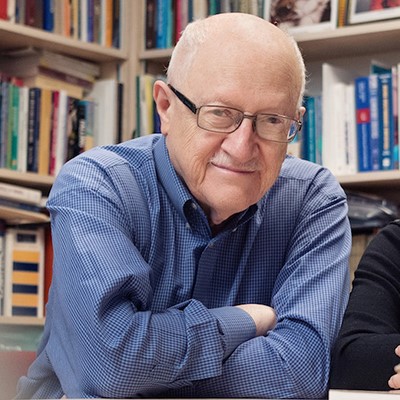Challenge, Stress, Trauma: Pathogenesis and Salutogenesis
-
Peter Suedfeld, Psychology, and Green College Foundation Fellow
Coach House, Green College, UBC and livestreamed
Wednesday, March 29, 5-6:30pm with reception to followin the series
Psychological Trauma and Resilience
Emeritus College Series at Green College -
The road of life is marked by many obstacles to success and happiness, peace and quiet. The emphasis of many experts in the helping professions is on the psychological damage caused by these obstacles, ranging from mild frustration to a shattered life. The presentation will assess such beliefs, and propose a different perspective: how threats are overcome, and may even be sources of psychological strength and growth.
This event has been co-organized with the UBC Emeritus College.
 Peter Suedfeld survived the Nazi Holocaust in Hungary. After emigration in 1948, he was educated in the US (BA, Queens College, City University of New York, MA and PhD, Princeton). He is a veteran of the US Army and the US Air Force Reserve, and has dual citizenship in the US and Canada. Prior to coming to UBC as Head of the Department of Psychology in 1972, he taught at the University of Illinois and Rutgers. His research deals primarily with adaptation and resilience during and after challenging, dangerous and/or extreme environments and experiences. These have included restricted environmental stimulation, life and work in the two polar regions and space, high-level political and military decision-making and information processing under stress, and experiences in environmental disasters, solitary confinement, persecution and genocide. He is a Fellow of the Royal Society of Canada and has received various Canadian, American and international awards for his research. In 2019, he was invested as an Officer of the Order of Canada.
Peter Suedfeld survived the Nazi Holocaust in Hungary. After emigration in 1948, he was educated in the US (BA, Queens College, City University of New York, MA and PhD, Princeton). He is a veteran of the US Army and the US Air Force Reserve, and has dual citizenship in the US and Canada. Prior to coming to UBC as Head of the Department of Psychology in 1972, he taught at the University of Illinois and Rutgers. His research deals primarily with adaptation and resilience during and after challenging, dangerous and/or extreme environments and experiences. These have included restricted environmental stimulation, life and work in the two polar regions and space, high-level political and military decision-making and information processing under stress, and experiences in environmental disasters, solitary confinement, persecution and genocide. He is a Fellow of the Royal Society of Canada and has received various Canadian, American and international awards for his research. In 2019, he was invested as an Officer of the Order of Canada.Psychological Trauma and Resilience
Emeritus College Series at Green CollegeA series on “Intergenerational Effects of Psychological Trauma,” hosted jointly by the Emeritus College and Green College in 2021-22, revealed an interest, appetite and need for further conversation in light of the trauma that we have all experienced over the past two to three years. Presentations in the course of the previous series yielded descriptions of the multifaceted nature of responses to the trauma experienced. They also raised questions about what contributes to or detracts from resilience. This new series, to be launched in the spring of 2023 and running through the main 2023-24 academic session, sets out to explore some of the many ways in which individuals and groups respond to trauma as well as identification of some specific and effective approaches to increase resilience.

-
Unless otherwise noted, all of our lectures are free to attend and do not require registration.
Custom Lecture Fields
|